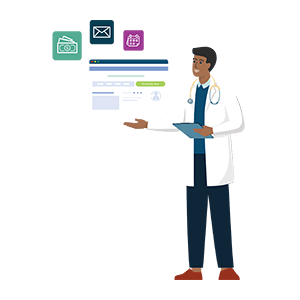The Rise of Surcharging in Healthcare: Trends and Implications
By Chloe From Clearwave | June 4, 2025
Disclaimer: This resource is designed to inform and support healthcare practices in understanding the emerging conversation around surcharging. It is not intended as legal, financial or operational advice. Practices should perform their own due diligence and consult with legal counsel before implementing any surcharging or cost recovery policy.
Navigating rising costs at your healthcare practice? You’re not alone.
Cost recovery strategies are becoming a more common consideration, as healthcare practices explore new ways to manage rising operational costs. One approach gaining increased attention is surcharging—passing along credit card processing fees to patients.
In this article, we’ll define what surcharging in healthcare is, examine its potential benefits and drawbacks and explore how it fits into the broader landscape of cost recovery strategies that healthcare practices are evaluating today.
What Is Surcharging?
Surcharging is a tool healthcare providers use to charge patients a small, additional fee when they pay with a credit card. This fee is meant to offset the costs of credit card processing, which can add up significantly for high-volume practices.
It’s important to distinguish surcharges from other related charges, like convenience fees.
Convenience fees are typically applied when a specific, alternative payment channel is used—such as paying online or over the phone—rather than in person.
With the prevalence of credit card fees in industries like retail, dining and travel, many patients are increasingly familiar with the concept of businesses charging credit card fees to customers. Still, healthcare remains a unique and sensitive environment, which requires a thoughtful approach to patient communication and regulatory compliance.
Can Medical Offices Charge Credit Card Fees?
According to a Medical Group Management Association article on Credit Card Surcharges for Medical Practice Payments, “As of 2024, only a few states prohibit credit card surcharges, in which businesses charge an extra fee for paying with a credit card. However, it’s crucial to know your state’s specific regulations prior to implementing credit card surcharges in medical practices. Some states may have certain restrictions or guidelines on surcharging based on requirements from attorneys general or bar associations.”
The bottom line? There are many considerations healthcare practices must take into account before potentially charging credit card fees to their patients. Like any financial decision, implementing a surcharge policy comes with advantages and drawbacks. Understanding both sides can help you make the best decision for your medical practice.
Pros and Cons of Charging Credit Card Fees to Patients in Healthcare
Pros of healthcare surcharging
- Reduces payment processing costs: Offsets the 2–4% fees typically incurred through credit card transactions
- Preserves margins amid inflation: Helps protect profits without raising the price of services for all patients
- Avoids broad price increases: Instead of adjusting fees across the board, only those paying with credit cards are impacted
- Encourages alternative payment methods: Promotes lower-cost options like ACH, cash or debit card payments
Cons of healthcare surcharging
- Potential patient frustration: Patients may view surcharges as unfair or frustrating, especially when paying for essential care
- Increased staff training: Staff must be prepared to explain and enforce the policy clearly and consistently
- Communication and consent requirements: Legal and card brand rules often require that patients are informed prior to payment
- Regulatory and payer restrictions: Some states and payers prohibit or limit surcharging. For example, a Medicare surcharge is not allowed for covered services. Be sure to perform due diligence, as regulatory rules vary by region and payer type. Here’s a resource to get you started.
How Clearwave Clients Are Tackling Rising Costs
As a strategic partner to healthcare practices, Clearwave has heard firsthand how organizations are approaching surcharging and rising costs in general. While some practices are exploring surcharging to recoup processing costs, others are choosing alternative paths to maintain their margins.
If surcharging doesn’t align with your practice’s goals or compliance constraints, there are plenty of effective, patient-friendly alternatives to increase revenue and reduce operational costs. These solutions improve profitability, while also reducing staff workloads and maintaining happy patients. With automation and self-service tools in place, practices can scale efficiently, and without adding more administrative staff. Saving on FTE spend right off the bat!
For practices who are not ready to launch surcharging, here are a few alternative strategies that Clearwave clients are successfully using to offset rising costs.
- Digital point-of-service collection: Consistent collections, prior to patient care, are essential for steady revenue streams and helping practices reduce write-offs and lost revenue. Using kiosk and mobile registration methods, Clearwave Clients are consistently capturing point-of-service payments from patients. These payments include co-pays, past-due balances, self-pay and even estimations. For example, after implementing kiosks, one practice saw a 40% jump in point-of-service collections. It’s that simple. See how!
- Cash discounts and price adjustments: Along with inflation, some practices are adjusting their cost of services slightly to account for card usage, while others are incentivizing patients to pay with cash or lower-cost methods. These efforts help practices reduce the impact of credit-card fees on their bottom line.
- Advanced payment features and tools: Practice leaders are doing their due diligence by finding modern tools they can use to streamline billing actions and make it easier for patients to pay. Many Clearwave clients are looking into new payment options, like card-on-file or tap-to-pay, both of which help practices accelerate collections and streamline payments across the patient journey.
- Automated patient estimations: Clearwave clients are also considering AI-based estimates, which help practices automatically create and send patient estimates. Sending estimates prior to care can provide financial transparency and help patients show up prepared to pay not only their co-pays, but also their full responsibility for their visit. This approach helps practices reduce time in accounts receivable and increase overall collections.
- Online self-scheduling: Online scheduling adoption by healthcare practices has grown from 34% to 75% in recent years. The shift to digital scheduling is helping Clearwave practices increase bookings and save hours of staff work. It’s also helping our customers make the most of their advertising dollars and reduce overall marketing costs. By combining a powerful online scheduling solution with a robust marketing dashboard, healthcare practices are reducing marketing spend while increasing conversions. See how.
- Real-time eligibility verification: Clearwave customers are continuing to avoid costly claim rejections and resubmission fees, helping them save across their revenue cycle. With the Clearwave Dashboard, a practice’s billing team can spot and solve patient insurance issues fast, leading to a 94% drop in claim rejection rates and staff time savings of 500+ hours per year.
Final Thoughts: Healthcare Surcharging is One Option, But Not the Only One.
Can medical offices charge credit card fees? In many cases, yes—but the decision isn’t black and white. Surcharging in healthcare may help some practices manage costs, but it also requires compliance, transparency and sensitivity to the patient experience.
Ultimately, every healthcare organization must determine what works best for its operations, staff and patients. Whether or not you choose to implement a credit card surcharge, there are many strategic avenues to protect your profit margins while also providing top-line patient experiences.
At Clearwave, we’re here to support your growth goals—with or without surcharging. From streamlining check-in to accelerating collections, our patient-led solutions empower practices to do more with less.
Want to explore how Clearwave can support your revenue goals? Let’s talk about helping your practice get paid!




